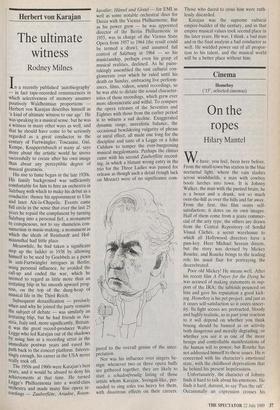Herbert von Karajan
The ultimate witness
Rodney Milnes
In a recently published 'autobiography' — in fact tape-recorded reminiscences in
which selectiveness of memory assumes positively Waldheimian proportions Herbert von Karajan describes himself as
`a kind of ultimate witness to our age'. He was speaking in a musical sense, but he was a witness in many other ways as well, and that he should have come to be seriously regarded as a great conductor in the century of Furtwangler, Toscanini, Gui, Kempe, Knappertsbusch et many al. says more about the artistic world he strove successfully to create after his own image than about any perceptible degree of musical greatness.
His rise to fame began in the late 1920s. His family background was sufficiently comfortable for him to hire an orchestra in Salzburg with which to make his debut as a conductor: thence his appointment to Ulm and later Aix-la-Chapelle. Events came full circle in the sense that over the last 25 years he repaid the compliment by turning Salzburg into a personal fief, 'a monument to conspicuous, not to say shameless con- sumerism in music-making, a monument in which the ideals Of Reinhardt and Hof- mannsthal had little place. Meanwhile, he had taken a significant step up the ladder in 1938 by allowing himself to be used by Goebbels as a pawn in anti-Furtwangler intrigues in Berlin; using personal influence, he avoided the call-up and ended the war, which he seemed to regard as little more than an irritating blip in his smooth upward prog- ress, on the top of the dung-heap of musical life in the Third Reich.
Subsequent denazification — precisely When and why he joined the party remains the subject of debate — was similarly an irritating blip, but he had friends in Au- stria, Italy and, more significantly, Britain: it was the great record-producer Walter Legge who led Karajan out of the shadows by using him as a recording artist in the immediate postwar years and eased his Path back to the concert platform. Interes- tingly enough, his career in the USA never really took off.
The 1950s and 1960s were Karajan's best Years, and it would be absurd to deny his achievements at that time. He turned Legge's Philharmonia into a world-class orchestra and made many fine opera re- cordings — Zauberflote, Ariadne, Rosen- kavalier, Hansel and Gretel — for EMI as well as some notable orchestral discs for Decca with the Vienna Philharmonic. But as his power grew — he was appointed director of the Berlin Philharmonic in 1955, was in charge of the Vienna State Opera from 1957 to 1964 (the result could be termed a draw), and assumed full control of Salzburg in 1964 — so his musicianship, perhaps even his grasp of musical realities, declined. As he pains- takingly assembled the vast cultural con- glomerate over which he ruled until his death on Sunday, embracing live perform- ances, films, videos, sound recordings, so he was able to dictate the sound character- istics of those recordings, which grew ever more idiosyncratic and wilful. To compare the opera releases of the Seventies and Eighties with those from the earlier period is to witness a sad decline. Exaggerated dynamic range, unrealistic balance, the occasional bewildering vulgarity of phrase or aural effect, all made one long for the discipline and taste of a Legge or a John Culshaw to temper the ever-burgeoning musical megalomania. Perhaps the climax came with his second ZauberflOte record- ing, in which a blatant wrong entry in the trio for the Three Ladies was passed for release as though such a detail (tough luck on Mozart) were of no significance corn-
pared to the pretation.
Nor was his influence over singers be- nign: whenever two or three opera buffs are gathered together, they are likely to start a schadenfreudig listing of those artists whom Karajan, Svengali-like, per- suaded to sing roles too heavy for them, with disastrous effects on their careers.
overall genius of the inter- Those who dared to cross him were ruth- lessly discarded.
Karajan was the supreme cultural empire-builder of the century, and in that empire musical values took second place in the later years. He was, I think, a bad man and in the final analysis a bad conductor as well. He wielded power out of all propor- tion to his talent, and the musical world will be a better place without him.


















































 Previous page
Previous page